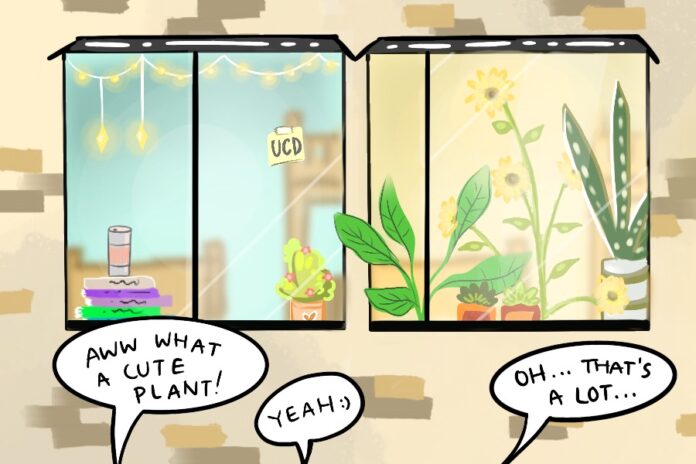Written by a college student, 10 baby plants later
By MAYA KORNYEYEVA — mkornyeyeva@ucdavis.edu
This year, I opted to live in one of the residents halls on the UC Davis campus. As I got to know the students in the building, one pattern became increasingly clear: almost every single room contained a plant. A succulent, a bouquet of flowers, a tiny sprout, you name it.
When I asked why, most residents gazed back at me with thoughtful expressions before replying with something along the lines of: “I like taking care of it,” or “It brightens the room.” Intrigued, I bought a $5 succulent from Trader Joe’s a few weeks after moving in. Turns out, it takes quite a bit of effort to keep a plant alive, like remembering to water it, giving it enough sunlight and keeping the soil healthy. As time progressed, I got better at maintaining it. Now it sits on my windowsill, adding a dash of color to the muted browns and beiges of the walls and furniture.
With that being said, I am willing to bet that there was a deeper effect on my living space than just the added aesthetic appeal of the plant. In fact, there is actually a bit of psychology behind this. For one, research shows that bringing a little bit of the natural world into our indoor environment promotes better quality of life and minimizes stress and mental fatigue — especially among university students. Being within a self-created “green space,” whether it’s on a grassy lawn or inside your overgrown apartment, can encourage creativity and actually boost academic performance.
I can’t help but agree with these findings, as I am often drawn to the Arboretum for a morning stroll before midterms, and find myself feeling significantly calmer afterward. I love sitting under a tree on the Quad doing homework, and I’ve recently taken a liking to keeping a fresh vase of flowers on my desk. Not only are they beautiful, but they are also a daily reminder to go outside and enjoy a bit of natural scenery.
Additionally, raising a plant and taking on the responsibility of caring for it is proven to be associated with feelings of satisfaction and improved mood, as “contact with plants is an intuitive and nonverbal activity that can provide psychological stability and comfort.” It can also create a routine, which is beneficial for staying organized and avoiding feeling overwhelmed. The life of a college student can be immensely busy; taking those five minutes out of the day to water your plant and tilt it toward the sun can keep you feeling grounded.
In this way, there is, in fact, rhyme and reason for the common occurrence of houseplants in university students’ living spaces, and the homes of most people for that matter. The culminating motif is that we have a natural affinity for life, and living and growing alongside it has a wide array of both physiological and psychological benefits. I am happy to say that my succulent is still alive and doing well and I’ve added nine other new plants to our leafy family — although they are comparatively less prosperous than the expansive assortment of plant species in the dorm of the horticulture and agronomy major two suites down from mine.
No matter your gardening experience, I highly recommend becoming a proud parent of a baby plant and taking it upon yourself to maintain it and help it grow. Mine is named Stevie… What about yours?
Written by: Maya Kornyeyeva — mkornyeyeva@ucdavis.edu
Disclaimer: The views and opinions expressed by individual columnists belong to the columnists alone and do not necessarily indicate the views and opinions held by The California Aggie.




